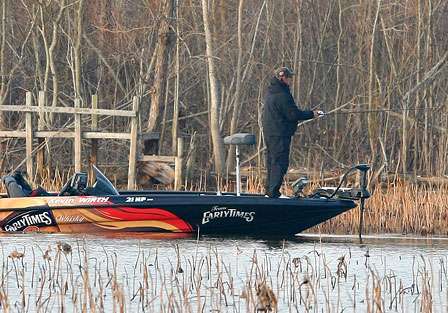
BOSSIER CITY, La. — Greg Pugh was casting in a backwater, shaking off every bite he hooked. But he was having trouble concentrating, because a few yards away were a pair of recreational fishermen sacking bass after bass.
The last straw was a 5½-pounder that they caught and released. Pugh, one of the 51 anglers practicing for the last time before the Bassmaster Classic begins Friday, turned to his observer and said, loudly enough for the other anglers to hear: "I just can't take it."
As he readied to leave, they politely wished him good luck. "I told them, 'I need all the luck I can get — I just wish the fish weren't sore-mouthed,'" Pugh recalled later.
Translation: If you really want me to be lucky, stop whackin' all the dang fish.
A quick survey of the anglers after practice turned up several answers to the question, What's your biggest obstacle to winning this Classic? Pugh's quick reply — "Locals." — while not the only response, was echoed by several others.
"Any time you find fish, and you watch locals catch them, it weighs on your mind," Pugh said. But there's not much to be done. "Any time you go to a lake," he continued, "it's everybody's lake."
The difference between the Red River and most lakes is you can't always see where you're going — or get to where you want to. Anglers will be slithering into backwaters that may, for all they know, be packed with other competitors or recreational anglers.
"There are plenty of fish in the areas where the boats are," 2007 Classic champ Boyd Duckett said. "But people won't have as many (fish) as they think they do once they share it with six other boats."
Said Elite Series pro Kevin Wirth: "The river is so low right now, there are very few areas to fish. It tends to bunch us up. I know there are two or three places where I could win the tournament if I had them to myself. But that's not going to happen."
Aside from traffic, the anglers' other concerns were about how to manage their time. Reaching some of the choice backwaters requires them to idle their boats through stumpy, tree-choked rivulets. That takes five, 10, 15, 30 minutes each way, and once there, an angler's not guaranteed to have the water to himself, nor that the fish will be hungry, to boot.
The other time-suck is the locks that anglers have to traverse to reach Pool 4 and, even further south, Pool 3. Angler Mark Davis said he plans to fish Pool 4, but worries that anglers in the first flight will have to hit the 1:30 lock time to return in time to make the weigh-in. That doesn't leave much time to, you know, fish.
"If you've got the time, there's probably a half a dozen places where you can win the tournament," Davis said.
Trouble is, some of those spots favor a late bite. Anglers will be waiting until the final moments before packing up and sprinting for the late lock times.
"In a lake, if you make a wrong move, you can adjust," Davis said. "Here, you can take yourself completely out of it with one wrong move. You're going to have to believe in what you have. There's going to be a fine line between success and failure in this one."
While most anglers have talked up the fishing, Wirth, for one, came back less optimistic. He thinks the weights will be lower than generally predicted, and that whoever wins the tournament will have to resort to junk fishing before it's through.
"There are going to be times where you have to fish stuff you might not want to fish," he said, "and hope like hell you get a bite."
